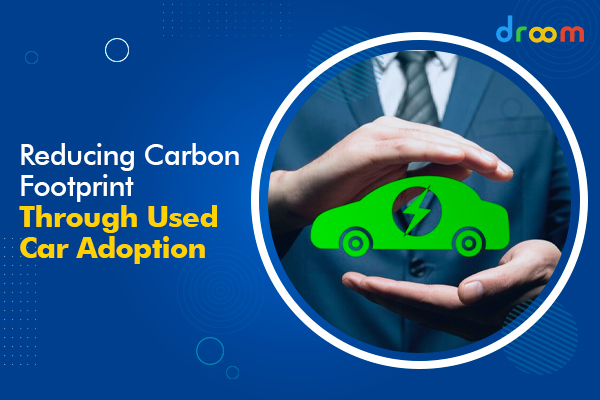We live in times when worries about climate change are rising. Cutting down our carbon footprint is very important. The automobile industry is a significant contributor to emissions. So, there is a lot of room for improvement. Electric cars and alternative fuels like hydrogen or biofuels are great options, BUT one effective strategy that often gets overlooked is buying used cars. Keeping existing vehicles on the road for longer instead of making new ones is better for Mother Nature.
It can really help reduce the harmful gases released by transportation. At the same time, buying secondhand cars is economical and provides affordable mobility to many. So, choosing a pre-owned vehicle ticks both the environmental and social boxes.
How Used Vehicles Play a Pivotal Role in Reducing Carbon Footprint
Here some of the many reasons why choosing a used vehicle is the Green option:
- Reducing Your Carbon Footprint
When you purchase a new car, it may seem like you are helping the climate since there is less air pollution. Although it might seem otherwise, the reality is that the manufacturing of new cars itself is not environmentally friendly. Much of it involves the extraction of raw materials, energy-intensive fabrication methods, and transportation of parts, so this results in a high carbon footprint.
But if you decide on the less expensive option of a used car, you are able to continue the life of the car that already exists in the automobile industry. By selecting a used automobile, people are contributing to the conservation of new vehicle production. This refers to less emissions and resource consumption.
- Preserving Our Resources
When new cars are produced, it takes a lot of valuable resources such as plastic, energy, and metal. By choosing pre-owned cars, you can help preserve these precious resources. Opting for a used car means avoiding the energy-intensive manufacturing process and the consumption of new materials that come with producing a brand-new car.
- Minimized Chemical Emissions
Purchasing a brand-new vehicle introduces various chemicals and substances that emit hazardous VOCs into the surroundings. Such emissions significantly degrade air quality and magnify pollution. Yet, used automobiles have concluded the off-gassing process, thus releasing fewer noxious emissions. Acquiring a pre-owned automobile indirectly curbs the release of detrimental chemical emissions into the atmosphere.
This choice is crucial for environmentally-conscious individuals prioritizing clean air and minimizing pollution impacts. By opting for a secondhand car, one contributes to reducing hazardous atmospheric contamination. Selecting a used vehicle indirectly supports cleaner air and lower pollution levels.
- Minimized Packaging Waste
Buying a new car usually comes with a significant amount of packaging materials, such as plastic wraps and protective covers. These materials are important for protecting the vehicle during transportation and delivery. However, they often end up adding to landfill waste. On the other hand, used cars usually don’t involve the same excess packaging, which can help reduce waste over time.
- Abundance of Fuel-Efficient Models
For those who prioritize fuel efficiency in their environmentally conscious decisions, there’s good news. There’s a wide array of second hand cars available on the market with exceptional fuel economy ratings.
Many older models boast fuel-efficient technologies that can compete with, or even outperform, the efficiency of newer vehicles. These vehicles not only save you money at the gas pump but also contribute to lowering your carbon footprint by consuming less fossil fuel.
- Reduced Environmental Impact of Manufacturing
The production of new automobiles exacts a considerable toll on resources and generates a significant amount of greenhouse gas emissions. Throughout the manufacturing process of a new car, energy is consumed, and pollutants are emitted, starting from the extraction of raw materials all the way to part assembly.
However, when you opt for a used car, you’re effectively reducing the demand for the production of new vehicles, thereby lessening the environmental impact associated with manufacturing.
Conclusion
Opting for second hand cars presents a pragmatic and effective solution in the collective effort to reduce our carbon footprint. By extending the lifespan of existing vehicles, we minimize the environmental impact associated with manufacturing new cars while simultaneously curbing emissions released into the atmosphere.
Moreover, choosing pre-owned vehicles conserves valuable resources, minimizes chemical emissions, reduces packaging waste, and offers access to fuel-efficient models. Embracing the adoption of used cars represents a simple yet impactful step towards achieving a more sustainable and eco-friendly future.


